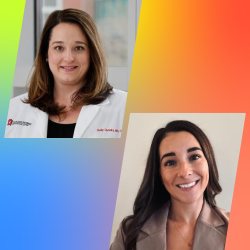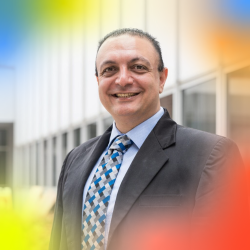Jin Xiao, DDS, PhD, describes her work in perinatal oral health among underserved populations to establish oral health equity at birth.
In this second blog to mark Asian American and Pacific Islander Heritage Month in May, Jin Xiao, DDS, PhD, outlines her work to improve access to dental care for underserved pregnant women and babies. Xiao is Associate Professor and perinatal oral health expert at the Eastman Institute for Oral Health at the University of Rochester Medical Center (Rochester, New York).
“As a perinatal oral health specialist, I take care of moms during pregnancy and their babies during the first year or so,” explains Xiao. “Oral health during these periods is a major public health issue, with many pregnant women suffering from dental pain. Also, maternal dental issues – especially the oral microbiome – can affect the baby. Gum disease during pregnancy is associated with preterm and low-birth-weight babies, and oral yeast and bacterial infections can be passed from mother to baby.”
Early childhood caries, or tooth decay, is one of the most common chronic childhood diseases, with around 1.8 billion new cases each year worldwide, mostly affecting children who live in poverty. Some 75% of preschool children from underserved communities all over the world suffer from this type of decay.
“Underserved individuals – including those within AAPI populations – may have particular problems accessing dental care, with limited dental clinics accepting those who are uninsured or who have state health coverage such as Medicaid,” says Xiao. The COVID-19 pandemic may also have disproportionately impacted AAPI populations’ dental care, with nearly 10% of the 6 million people who lost dental coverage identifying as Asian American, compared with 5% in the overall population.
“My institution set up a perinatal dental clinic exclusively for underserved women and babies in 2018,” states Xiao. “This is the first such clinic in the nation. Since 2018, more than 1,000 moms and babies have been treated, and at least half of the babies being brought back for their first dental visit before the age of one. This was a great step forward, providing a ‘dental home’ for these mothers and children.”
In a first-ever study of its kind led by Xiao, underserved racial and ethnic minority mothers and babies will be the focus of an effort to predict severe childhood tooth decay in early infancy. The five-year study is funded by a $3.5 million grant from the National Institutes of Health (NIH) National Institute of Dental and Craniofacial Research (NIDCR). To learn more about early-life biological factors related to severe tooth decay, the study will examine 2,000 previously-collected saliva samples and sequence the spectrum of oral microbes.
Xiao is also leading a project that will apply technology to support dental health in around 1,000 pregnant women in underserved communities each year. “For this project, we are meeting women while they are at a routine obstetrician visit, taking advantage of the fact that they are on-site at the hospital,” says Xiao. “The women will have intra-oral photos taken, and will install a smartphone app developed by my team. Called AICaries, this app can detect early signs of dental decay, which starts with chalky white marks that are often missed, and can be resolved by modified brushing or dietary changes. The app also enables a virtual dental visit to be scheduled if these marks are found, helping avoid future fillings and reduce health disparities.”
Funded by the University of Rochester Medical Center’s Health Equity Program Support Office, the project is titled, “SMARTeeth-Smart Connected Oral Health Community: Using AI and Digital Technologies to Close the Gaps in Oral Health Disparity.”
“At the Eastman Institute for Oral Health we are taking a multi-faceted approach to improving dental health for underserved populations,” concludes Xiao. “Through our perinatal dental clinic, we provide overall clinical service, while also researching the role of the oral microbiome, and engaging with the community on the digital technology-based SMARTeeth program. Together, these are important steps forward in addressing disparities in dental care access for our local communities, and establishing oral health equity at birth.”



